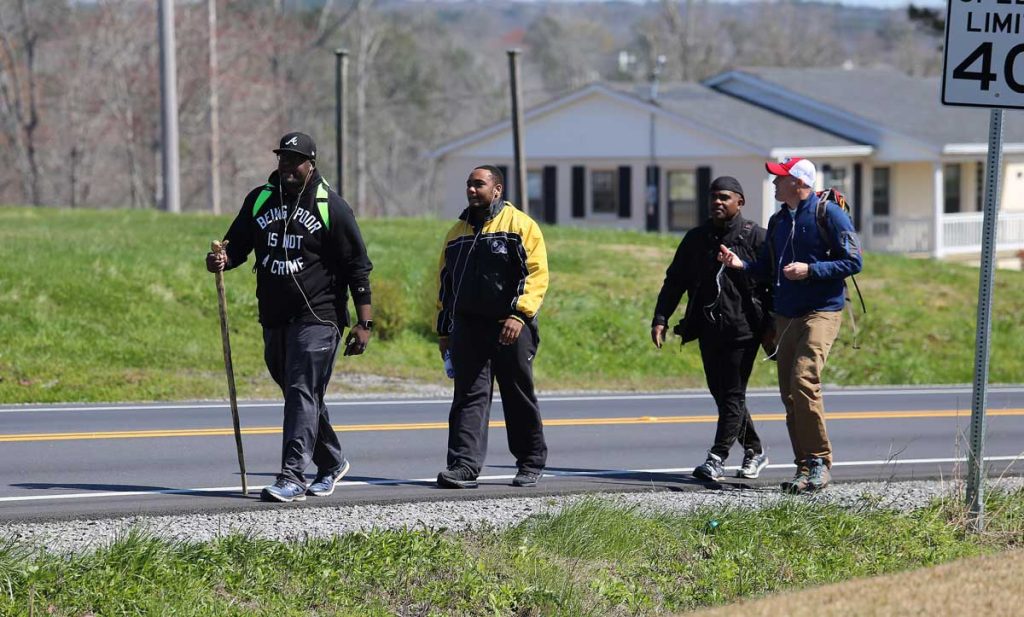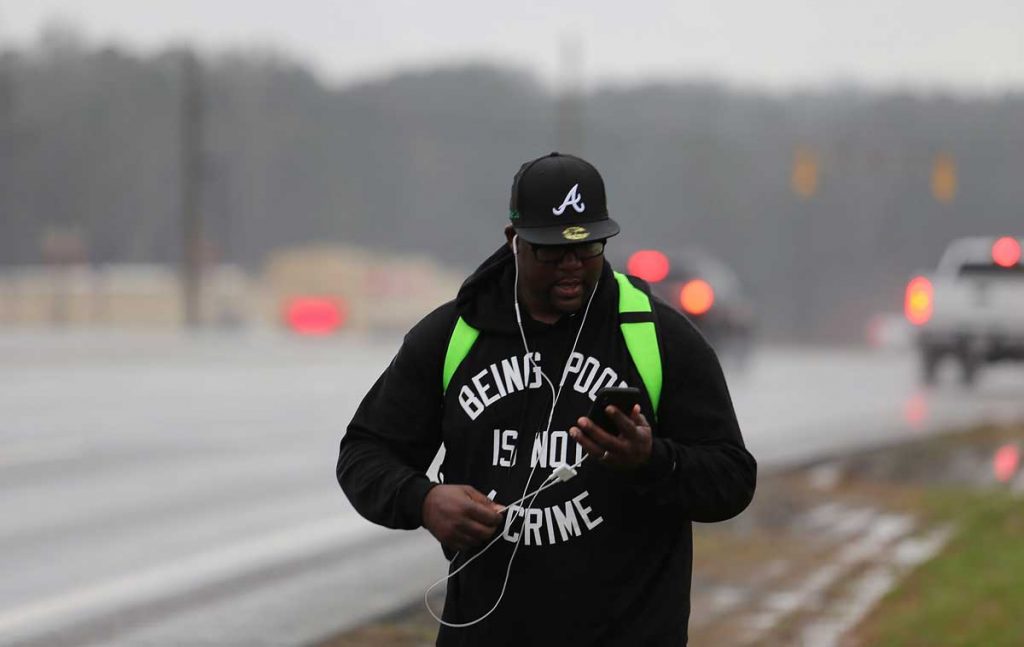Traveling 367 miles from Atlanta to Memphis by car would take almost six hours. By bus, it would take almost nine. But on foot, it’s taken Terence Lester a month.
Lester marching between the two cities against poverty and in commemoration of the legacy of the Rev. Martin Luther King Jr.
About four and a half years ago, at the age of 30, Lester founded Love Beyond Walls to advocate for individuals experiencing extreme poverty and to provide social services and community to the impoverished and homeless. Located in Atlanta, where Lester was born and raised, the center serves 500 to 1,200 families every month.
Of the many causes for which he could have advocated, Lester said he chose homelessness and poverty because it plagued his own life. As a teenager, he ran away from home and was homeless for almost a year.

Terence Lester walks from Atlanta to Memphis in time for Martin Luther King Jr.’s 50th anniversary of his assassination. He reached the Lorraine Motel on Tuesday after marching against poverty for a month. Photo Courtesy: Terence Lester
Living in poverty and growing up in a dysfunctional household, Lester watched his parents split early, and, consequently, internalized a lot of his feelings and lacked a close bond with his family.
Although he dropped out of school during that time, Lester followed the advice and encouragement of a homeless man and went back to school as a fifth-year senior. He calls this period the most embarrassing time of his life.
Fittingly, Lester had this life-altering conversation less than a mile away from his organization’s center and in front of the alternative school he once attended.
“He told me one of two things (would happen): I would end up either like him – he was in his late 50s, homeless – or I could go back and become a leader,” Lester said.
After returning to and graduating from high school, Lester earned four degrees: an associate’s, a bachelor’s and two master’s.
“I think, for me, I’m a servant leader, and I wanted to be able to use my education in a way that did not just have me accumulating a bunch of stuff,” he said. “You know, everybody’s on this pursuit of getting a bigger house, bigger car. I wanted to use my education to impact the lives of those I felt most connected to, which were the people that are suffering.”
Lester started his march from the National Center for Civil and Human Rights in Atlanta on March 3 and arrived at the Lorraine Motel in Memphis on Wednesday, the 50th anniversary of King’s assassination. By the Friday prior to his arrival, he had walked 28 days straight.
Sick with a cold and on medication from walking through two days of rain, Lester experienced physical tiredness, fatigue and weakness as he made his way through Mississippi.

Terence Lester walks from Atlanta to Memphis in time for Martin Luther King Jr.’s 50th anniversary of his assassination. Ali Brathwaite, James Brookshire and Johnny Taylor walk with him as his videographer, volunteer and campaign partner. He reached the Lorraine Motel on Tuesday after marching against poverty for a month. Photo Courtesy: Terence Lester
As he walked, Lester made mental notes of the poverty he saw. He counted 190 abandoned buildings along the way, “knowing that we have some of the access to eradicate some of the issues that plague people.”
While walking through Alabama, Lester was reported to the police five times and had several unpleasant encounters with dogs. Even though Lester walked alone with a spot car following him, such calls would claim that four black men were carrying sticks or that there was a black man who looked suspicious.
To ease racial tensions during the trip, Lester’s white friend James Brookshire joined him and walked in unity. When police would approach Lester because of those complaints, Brookshire defused the situation.
“Experiencing that first hand, it makes you think about what perspectives are held by people who don’t look like you and why they hold those perspectives,” Lester said. “And then it also speaks to the aspect of – there are people like my friend James – willing to walk on with me and stand against an issue.”
Going through Polk County, Georgia, Lester encountered two trucks decorated with Confederate flags, from which riders spat racial slurs and flipped him off.
“It makes me sad; it makes me angry, especially encountering some people that have racial slurs that have that flag. But, then, I have this thought,” Lester said. “That many of the people with those flags that might not like the color of skin are also poor, and I’m walking on their behalf as well.”
Able to tap into King’s idea of love and compassion that supersedes all lovers of hate, Lester recalled how, before King was assassinated, he was in Memphis working for poverty eradication for sanitation workers, speaking to poor people and advocating for people working under poor conditions who had no union representation.

Terence Lester walks from Atlanta to Memphis in time for Martin Luther King Jr.’s 50th anniversary of his assassination. He reached the Lorraine Motel on Tuesday after marching against poverty for a month. Photo Courtesy: Terence Lester
“So, I connect that to the work we stand for, week after week, at Love Beyond Walls back home. We see those stories: people working 40 and 50 hours a week, making minimum wage, but they’re not living wages” he said. “We see homeless people struggle to find places to sleep. We see people struggling. One of the ways in which I felt called to elevate those stories was kind of like walk in their shoes, in a sense, and bring attention to the issues.”
Lester plans to use footage his videographer took during the walk to create a film about race in America as a piece meant not to divide but to serve as inspiration for people to to consider their neighbors, no matter their walks of life.
“I think we’re living in a pivotal time, right now, where we need more love and honest conversations at the center of our race relations,” he said.
Lester said he thinks silence continues to divide society, so honest conversations are important, and he said that even if there are disagreements, there does not have to be disrespect.
Despite the difficulties of his journey, Lester has already seen positive outcomes. So far, Lester said he’s FaceTimed a school, giving high school students the opportunity to ask him questions about poverty. He also said he has seen that some teachers are creating curriculum based on his journey to educate students about poverty.
“We’ve seen a lot of people being moved to take a stand and act in their own way,” Lester said. “This is what it is all about.”






